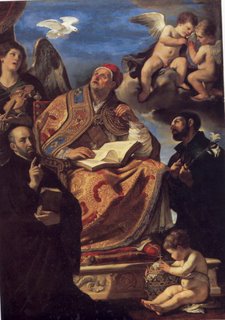 Souls are naturally attracted to God. The mind, or intellect, is naturally attracted to Truth, and the Will is naturally attracted to good as dictated by the mind. If the mind makes an error and points to the world as good, the free-will will love the world. If the mind erroneously point to sin as good, the free-will will love sin. When the mind points to sin as good thus an object of love it is because it made a mistake in thinking that sin is beneficial to the soul. There was an error. So the mind must be properly educated. And that is the purpose of the Catechism of the Catholic Church.
Souls are naturally attracted to God. The mind, or intellect, is naturally attracted to Truth, and the Will is naturally attracted to good as dictated by the mind. If the mind makes an error and points to the world as good, the free-will will love the world. If the mind erroneously point to sin as good, the free-will will love sin. When the mind points to sin as good thus an object of love it is because it made a mistake in thinking that sin is beneficial to the soul. There was an error. So the mind must be properly educated. And that is the purpose of the Catechism of the Catholic Church.
Though God, by Himself, can attract a soul — and this is how most saints were attracted to God — a push from behind can be of help sometimes. And this push has been suggested by St. Thomas Aquinas and largely used by the Dominicans. A great push from behind would be the writings of the Fathers and Doctors of the Church. Their writings are a great compliment to the attraction God uses to pull souls to Himself.
But this knowledge can sometimes pose a great danger to the soul if the purpose for studying these patristic writings does not coincide with the attraction or dilection that comes from God. For these writings to be a great help — a real push from behind– the soul must constantly have the right intention for studying; and this can be no other than wishing to learn how to love God. A little diversion from this purpose, which is to go against the very tradition of the Catholic Church, and this knowledge can puff one up, thus doing more damage than benefit to the soul.
If a soul studies Patristic writings in order to sound erudite, to be known as a patristic scholar, to be able to write a book authored by him, or for whatever reason that has nothing to do with loving God more, then that knowledge would just drag him down, aside from removing the dilection or attraction towards God that the soul experienced in the first place.
This attraction to love God was more than sufficient for saints such as St. Therese and St. Catherine of Genoa. They simply needed that attraction to know and love God. Others, like St. Benedict and St. Thomas Aquinas, though not needing it themselves, saw the help Patristic writers can give to their disciples. However, for us weaklings, we can never underestimate the danger of such a pursuit, if our minds and hearts are diverted in the process.
If a soul, like St. Therese, has such a sufficient attraction to love God, she would not need a push. But for most of us, we would need that push from the Fathers, the Doctors and the Saints. To read other books is definitely dangerous and should be avoided. This curiosity of learning other things, though theological, unless done solely for the purpose of knowing in order to love God, is dangerous. Such curiosity is referred to as the forbidden fruit. (Painting is St. Gregory with St. Ignatius and St. Francis Xavier, 1625.)

